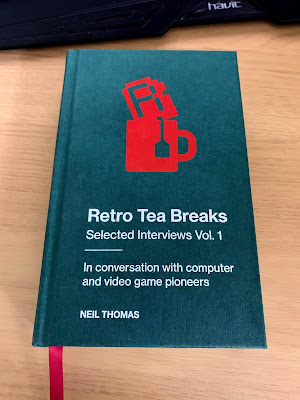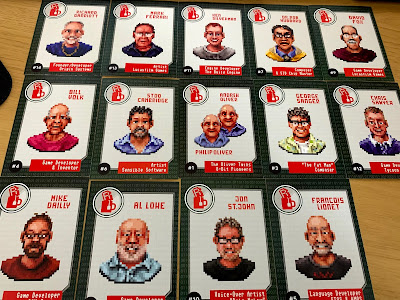Three books on videogaming today and, with a bit of a caveat on one, more worthy additions to my ever growing collection on the subject. At this rate, I should overtake the military history collection in about... oh, six years!
First up, The Art of Point and Click Adventures published by Bitmap Books.
After reading and thoroughly enjoying "The Games That Weren't", I had a gander at the publisher's website and when I saw this tome, I knew this had to be my next purchase. As you can see below, it arrived in the usual very well packaged condition.
The book itself measures 26.6 x 4 x 21.7 cm, and is a tad over five hundred pages in length. You get a lovely forward by Gary Whitta (formerly of UK gaming magazine ACE, US gaming magazine PC Gamer and now US-based scriptwriter of no ill repute), backed up by a potted history of point and click adventure games, and a glossary of terms used throughout the interviews. This is where the meat of the book begins.
And what a book! Set in chronological order from 1984 to 2020, individual titles are given between two and eight full pages of screenshots and descriptive text. The superb print quality brings these to life, no matter if they're monochrome, 16-colour EGA or current gen graphics. If this book was just that then I'd be happy to pay the £30 asking price. As a catalogue of games, this is un-matched. But that's not all.
Inter spacing the games are the interviews, forty-four in total. Ranging between two and six pages in length, these not only give background on the developers of key titles in the genre, but also provide another source of screenshots and artwork. The interviews themselves are well worth reading, not only for how the individual started off in the genre but also how they fought technological constraints to realise their vision and how the games industry has developed as both a creative and a business medium. The really good thing here is that you not only hear from familiar names such as Tim Schafer, Ron Gilbert, Ken Williams, Hal Barwood, Al Lowe and Charles Cecil but also from lesser known (to me, anyway) but no less talented developers such as Eric Chahi, Pierre Gilhodes, Simon Woodroffe and many more. The really sad thing after saying that is although the individuals names were unfamiliar to me, their games were not, and this tome is a great way of putting names to games, so to speak.
What this book has also done is re-kindle my interest in the wider point and click adventure genre. Sure, there are easy pickings on iOS/Android/X-Box such as LucasArts classics Grim Fandango, Full Throttle and Day of the Tentacle, but there are so many more out there and just a quick look at GOG.com reveals games featured in this book such as Bladerunner, Myst, The Dig and whole ranges of titles from the Kings Quest, Quest for Glory, Indiana Jones, Leisure Suit Larry and Space Quest series plus dozens more (and the prices are very reasonable). I know I'll be picking up some of the titles on GOG based on their mention in this book.
It is tempting to look at this book as perhaps a nostalgia trip, back to the genre's heyday of the 1980's and 90's, but that would be to miss the point. A lot of these titles are available to play today and remain excellent games in their own right. The Art of Point and Click Adventures is really a celebration. A (hefty) love letter to a form of play that, whilst not as mainstream as it once was, still retains a following whilst attracting new fans to the fold. This is an absolute must for genre fans and anyone with a passing interest. I know I say this a lot but really, the key to learning about a hobby is to push your boundaries a bit and you'll do far, far worse than to pick up a copy of this excellent reference. You never know, you might find yourself buying a few games and spending some time visiting far off worlds, meeting strange characters or just tagging along for the ride (bit like a weekend in Newcastle - pre 2020, obviously).
You can visit Bitmap Books here and check out their range of other titles. I think my next one might be The CRPG Book...
Next up is less about videogames and more about the videogames business as told by Ken Williams in Not All Fairy Tales Have Happy Endings.
Ken Williams, along with his wife Roberta, were the founders of Sierra Online, a software developer and publisher that was responsible for some of the greatest point and click adventures ever released. I've mentioned some of these above but just to be clear, we're talking about Kings Quest, Quest for Glory, Space Quest, Police Quest, Gabriel Knight and a whole lot more. In fact, there was recently a Kickstarter for a series of three volumes (with two more promised in a future Kickstarter) detailing the entire history of Sierra. I pledged for the hardback edition and, since the funding was more than successful, will hopefully receive the first three volumes in May next year.
But back to this book and as the author states from the get go, it isn't specifically about the games but a history of the company, that makes this an interesting if uncomfortable read.
This is a warts and all book and the author is at pains to state that his memory on certain areas may not be exact. He also states that where his opinions are concerned, he knows that he may not be right, but that's honestly how he sees it. It's not a fun tale in a lot of respects, as once the early years pass, it becomes very much a corporate story and, if you're like me and have a healthy dose of cynicism when it comes to anything corporate (or the dreaded management speak) then this book demonstrates that whilst you may be valued when needed, when you're no longer required, the corporation just don't care. Sucks to be you. The worst part is that Williams follows the corporate voice a lot, after all, that was his job, but the human cost of his behaviour and demands (working all hours until something is finished because it's your project, being pro-active to the point of forgoing all else at home and breaking yourself for a dollar) isn't much of his concern. He might feel bad for having to have sacked most of the company at one point but that's only worth a sentence here. No contrition, no empathy.
His attitude to labeling people by their outlook to work and attitude and how useful they are to him as a member of staff is also something I disagree with. It's very much "I only want really useful people who do so much I don't really have to manage them", or at least comes across as that. I kind of get the (predominantly) American ideal of the cult of the individual, but this seems to be another example of "I'm alright, Jack" and bugger anyone else who suffers. This is especially true when the later corporate illegalities lead to many staff losing what share value they had in the company at the time.
In the end, this is an informative book and one that should be read by anyone wanting to understand how software development worked as a business in the 1980's and 90's, and how it can still go wrong from a low level workers point of view today. That does not make it a fun read though.
You can buy the book on Kindle, where it is also part of the Unlimited plan or order it from the usual bookshops.
The last, but not least, tome is a much more pleasant read, coming as it does from RMC - The Cave. If you're not familiar with RMC - The Cave (formerly known as Retro Man Cave), this is a YouTube channel that has a primary focus on all things retro computing and gaming. It's a great channel and Neil who runs it has done a lot of work for charity off the back of it - including this rather wonderful retro calendar that will adorn my cave walls next year. I urge you to check out the channel if you haven't already.
Retro Tea Breaks Volume 1 is a collection of interviews transcribed from the YouTube channel with the addition of side notes and illustrations. As the title states, more volumes are planned (there are currently 34 tea-break videos on the channel), but in this one, you get fourteen chats with the likes of the Oliver Twins, Al Lowe, Rob Hubbard, Mark Ferrari and Richard Garriott.
The interviews are carried out well and that is down to the format - the tea break conversation. You get a real feel for the individual personalities here and whilst you can view each conversation online in its entirety, this book is about preserving select parts of them in a physical format. Speaking of which, the lovely pocket book presentation is wonderful, the binding is solid and the whole tome screams out quality.
Despite featuring people who I have already noted are in The Art of Point and Click Adventure, there is little repetition here and I would say that for point and click fans, there is a nice crossover between the two (unrelated) books. Funded by Kickstarter, my pledge included these rather lovely art cards by Stoo Cambridge (also one of the interviewees) and the whole package was well worth the price.
I do hope that further copies of this book will be available from the RMC store so that others can enjoy it. As for me, I'll happily support any funding efforts for future volumes!
So there you have three videogame themed books that deserve a place on your bookcase/Kindle. Now, time to get the order to Bitmap Books...









No comments:
Post a Comment